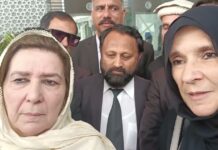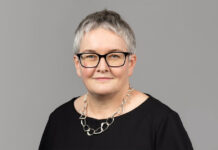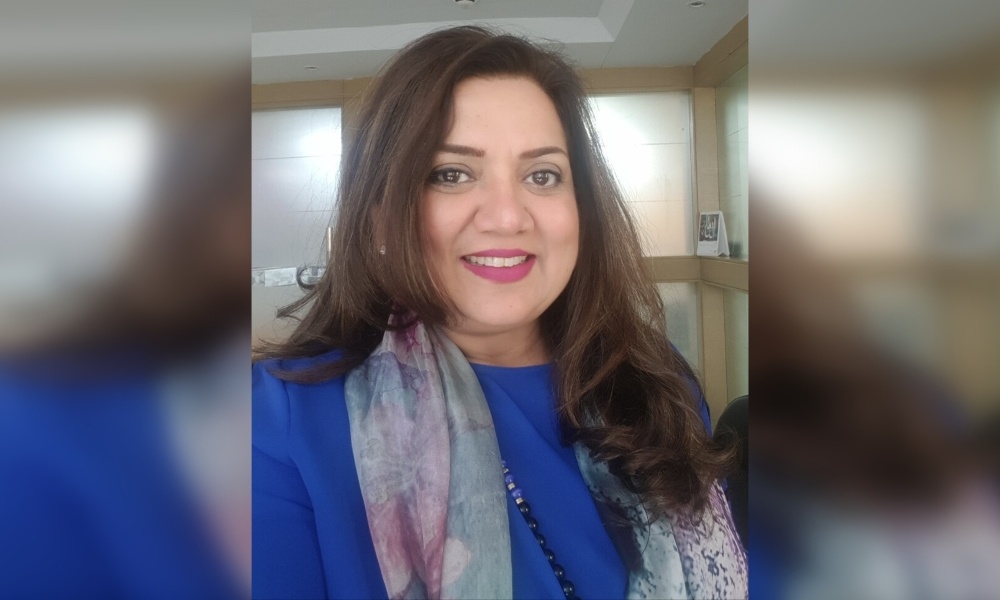For Brandsynario’s Women’s Week, we profiled Fouzia Janjua, Head of Branch Operations & Account Services at HBL.
As I step outside the elevator on the third floor of the HBL Plaza in Karachi, I am directed towards the corridor on the right which leads to a huge room full of cubicles and where employees are busy at work. Within this room, is a separate glass-walled office that belongs to Fouzia Janjua, the woman I have come to profile. As I step inside her spacious office, I see her gesticulating… engrossed in a conversation with her colleague sitting across her desk. The wall behind her is lined with shields, and in between, there is a truck art wall hanging with her name written in Urdu; the other walls are covered with pictures, showcasing the highlights of her career. Clearly, she is proud of her achievements.
Upon seeing me, she greets me with a firm handshake. A tall woman, Janjua has a very strong and assertive personality. For our rendez-vous, she is smartly clad in black (shirt and trousers, her dupatta neatly set around her neck), her dark-brown hair perfectly blow-dried and though wearing minimal makeup, her bright pink lipstick really stands out.
Fouzia Janjua, 55, is currently the Head of Branch Operations and Account Services at HBL– one of the largest banks in Pakistan, with 1,685 branches and 2,180 ATMs across the country.
Born and bred in Rawalpindi, she grew up in a military family. In her words: “Janjuas call themselves ‘a martial race’ hence a majority of the men in the family have served in the armed forces including my grandfather, my father, and even my father-in-law.”
She received her early education while living in the Mangla Cantonment (Jehlum), which according to her, was built by the Americans, and even during the early 70s, the school had a gymnasium and an auditorium and provided a variety of sports and recreational activities (cycling, hunting, singing etc.). She credits her first school for not only providing her with a strong academic foundation but also instilling in her the necessary confidence to succeed in the world beyond.
Growing up with her three siblings (two sisters and a brother), for Janjua, her father had been her constant support and her pillar of strength, encouraging her to study more, learn new skills, follow her aspirations, and most of all, giving back to society. “Women would generally say their mothers have been their biggest support, but in my case, it was my father. I’ve got his blessings.”
She recalls her late father (Aslam Janjua) getting his first lesson in women empowerment and emancipation while pursuing an aviation course in the United States in 1958, where his instructor ‘Colonel Joyce’ proudly introduced him to his wife in a café where she worked as a waitress – on voluntary basis. “My father said the first two lessons he learned then were: a) of equality and respect, and b) that a woman could work, even if it was voluntary work.”
Upon finishing college, unlike her two sisters, the eldest of whom took up medicine and the youngest who earned a Ph.D. in Biology from Germany, Janjua decided to take up finance and investment, much to her mother’s dismay, who thought that a degree in medicine would make her future more secure. She earned her MBA degree from Quaid-e-Azam University in Finance and Banking in 1989 after which she joined USAID’s Academy of Educational Development. The job entailed traveling across Pakistan to enhance people’s technical and vocational development.
It was during this time that one of her teachers, Humayun Rashid, who was then setting up Citibank in Pakistan, approached her and asked her to join him. In 1990, Janjua joined Citibank as Management Associate, Development Programme and in 1991 was sent to Singapore for training – this was her first trip abroad at the age of 22.
“It was a fine country. I saw female taxi drivers, managers, women running their shops in big malls, working in hotels; it truly emancipated females,” remarks Janjua, who soon after, expressed her desire to her mentor to become a branch manager someday in Pakistan (where having a female branch manager was unheard of and banking was a male-dominated sector).
While she still nurtured these aspirations, in 1994, Janjua got married and life changed drastically. Although she was still working for Citibank, now she had not only herself to think of, but also of her spouse and her in-laws, and here she says, “Striking a balance between work and family life is very important and your partner has to be very supportive.” In 1995, she went to work for Citibank London for a few months, “because my husband allowed me to go and work there and during this time, I saved up, returned, and paid Rs. 200,000 as an advance payment for our house myself.”
Furthermore, she believes it is imperative for women to have multitasking skills and willingness to make a lot of adjustments to their lives if they want to pursue their careers as well as live a balanced life. “I am a very organized person in the sense that it has been 30 years that I have been working and while doing that, I have cooked, cleaned, and dusted and taken care of every responsibility of my household, as well as entertained guests over the weekends. It appalls me when young working girls today say they do not have time to manage multiple things.”
The year 1996 was an auspicious one for Janjua as her dream eventually came true. “I was very fortunate that I was hired by Citibank Pakistan and they invested a lot in my training. In 1996, they made me the first female branch manager of a foreign bank in Islamabad,” she says and points towards a picture on the wall of herself posing with the Chairman Citi Corp.
Three months later, she gave birth to her daughter Mashaal.
Her daughter was only seven months old when Janjua took another trip to Singapore to do a course in treasury, and this time, her parents traveled with her to help her with childcare. As time went on, responsibilities of motherhood began taking precedence over ambition, and eventually in 2003, (after having served Citibank for over 12 years) she decided to take a break from banking. She resigned from Citibank as Regional Head (North).
That same year, she took up a position as Head of Finance and Investment at the National University of Science and Technology (NUST), where she brought in the culture of selecting potential students not only on the basis of their GPAs but also their skillsets. She also created linkages between the university and the banking sector by inviting prominent banking personalities as guest speakers, including Dr. Ishrat Husain (the then Governor, SBP), who had recently given his seventeen points on banking reforms. “I recall the NUST auditorium – previously the National Assembly in Ayub Khan’s era – where we invited all bankers for a session that lasted two and a half hours; it was one of the best milestones I have achieved in my careers,” says Janjua, who later extended the same invitation to Dr Chadda, Vice Chancellor, Jawaharlal Nehru University, India. She very proudly points out here that today, about 40 to 50 of her NUST students are working for HBL.
During the two years she stayed at NUST, Janjua admits the family had to make a financial impact and for some time, she had to move to a smaller house, but at no cost, she could not miss her daughter’s important growing years. “Nothing always happens your way; there are sacrifices that have to be made along the way and I made my share of sacrifices as well.”
In 2005, she joined Faysal Bank on the condition that she would be placed in either Rawalpindi or Islamabad. But she had hardly been there for a year, that NIB bank approached her. Owned by Temasek Holdings, the bank back then had only 31 branches. They had recently acquired PICIC and wanted a female representation in the amalgamation team in Pakistan. “PICIC had a senior team, while NIB consisted mostly of youngsters, and they wanted to make a happy marriage between the two.”
Here, however, her experience at NUST came in handy as she had to handle people of different age groups, and teaching at NUST had taught me to be more patient with students. She says she developed interpersonal skills and learned to take a step back, process, analyze and consider all options before taking action (very unlike the earlier fierce Janjua, who was quick to react and super hyper).
After three years, when she was asked to move to Karachi, she bade adieu to NIB. The relocation was an impossibility as her daughter was about to begin her O’level studies and her husband was well settled in Islamabad.
Next stop: First Woman’s Bank, where Shafqat Sultana was looking for people to raise funding for women and made Janjua an offer. Although it was a government job and the target market was entirely different from what Janjua had dealt with before, she took the offer and joined in 2009 as Sector Executive. According to her, this was for the first time that she got an opportunity to see what 51% of the Pakistani population was going through (she had only dealt with affluent, upper middle-class customers before this). During her tenure there, the bank opened branches for women in Gilgit as well as several universities around the country, including Fatima Jinnah University, International Islamic University, and the Allama Iqbal Open University.
In 2012, tragedy struck. Janjua lost her husband in an accident. This was followed by the demise of her mother-in-law and then her parents. Since all of her siblings lived abroad, she says it would have been really difficult to cope with the grief had it not been for her friends, colleagues, and neighbors.
Her daughter, now fifteen years of age, Janjua finally moved out of her comfort zone, to Karachi. “This is where I’d like to tell all girls that they must get used to getting out of their comfort zones, no matter how daunting it may seem. They must inhale confidence and exhale their fears because most of their fears exist in their imaginations only.”
While she was in Karachi, the FWB received USAID funding for Aurat Foundation, after which some prominent international women paid a visit to Pakistan, including Queen Maxima of Netherlands in 2016 whom Janjua had the honor to meet as well. The funding helped the bank empower home-based women workers, as well as those who wanted to start their own micro or small enterprises. “We also taught these women to document their businesses, become tax filers, get insured, account management and credit skills,” she adds.
In 2017, Janjua joined HBL as Regional Operations Chief (Multan region); the first woman ever to head the region. Her daughter is off to the UK for her studies (“this was a promise I made to my late husband, and I am glad I kept it”).
In Multan, she successfully managed to run a network of 115 branches and 150 ATMs in the Southern Punjab region (Layya, DG Khan, Mailsi etc.). “This place was entirely different from where I had come from, but I adjusted to their lifestyle (‘do as the Romans do’). Following a change in the HBL management after a month. She was eventually brought to Karachi to head Account Services and tasked to centralize 1,600 branches. She was later handed charge of looking after the ADC operations, which she handled very efficiently. She’s one of the few women in the country managing operations. ”HBL further emancipated and empowered me by making me the first female Branch Operations Head in its history, managing a team of 7,000 people pan Pakistan.”
At HBL, she also proactively participates as a member of the Diversity Council, where the bank, within a span of three years, has reached its target of having 20% females in the workforce, as well as extending paid maternity leave from three to six months, along with child support allowance.
Despite her busy and challenging life, Janjua has never lost her zest for life. When HBL does not keep her busy with operations, she loves taking care of herself, knitting, dancing, and gardening. Her daughter is her best friend and she says she loves traveling with her.
Since this profile was done keeping in mind the ‘Women’s Day’, I ask her what message would she like to give to younger women professionals. “I’d tell them that Life main difficulties atee hain… we all deal with ups and downs and challenges on a daily basis but do not give up. You will never be able to tackle your hardships if you impose them on yourself. We, as humans, have unique qualities and strengths and we should use them to our advantage. Stay positive, learn to control your emotions, and find opportunities in adversity.”
I ask her about her post-retirement plans and she says she really wants to do something for the women in Pakistan. As to what that ‘something’ is, remains to be seen. For now, she is a proud member of the HBL family and intends to stay there for as long as she can, because for her, despite the odds, “the journey has been totally worth it!”








































